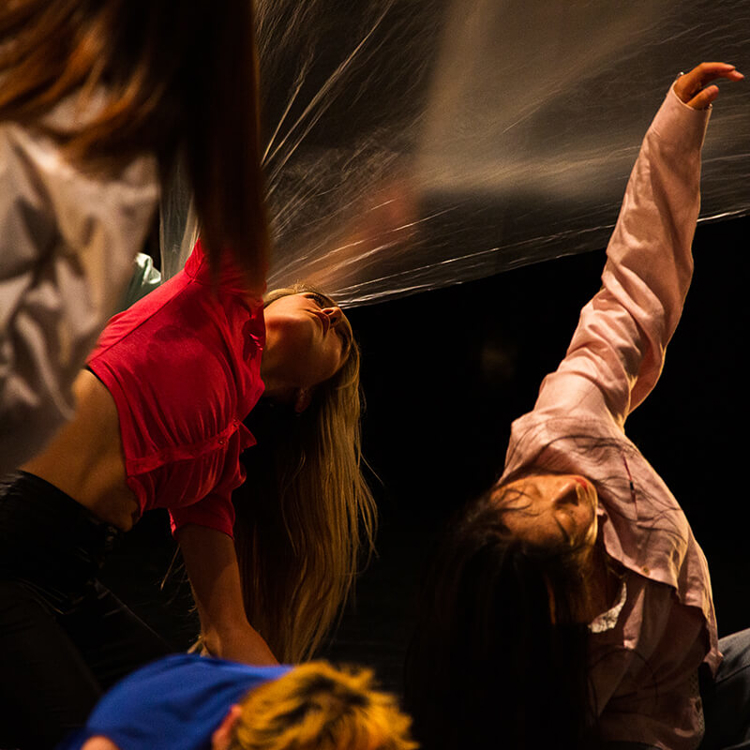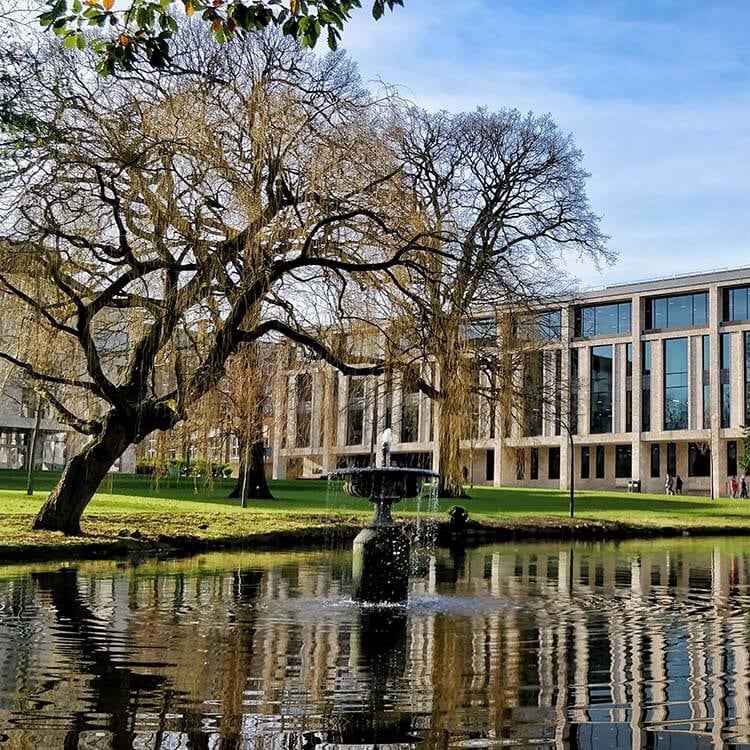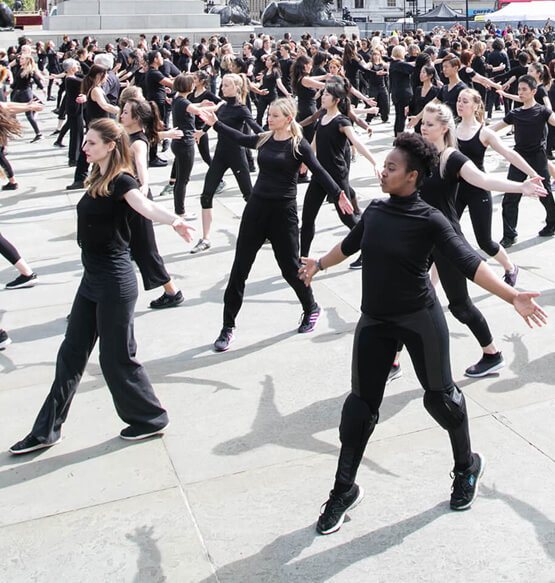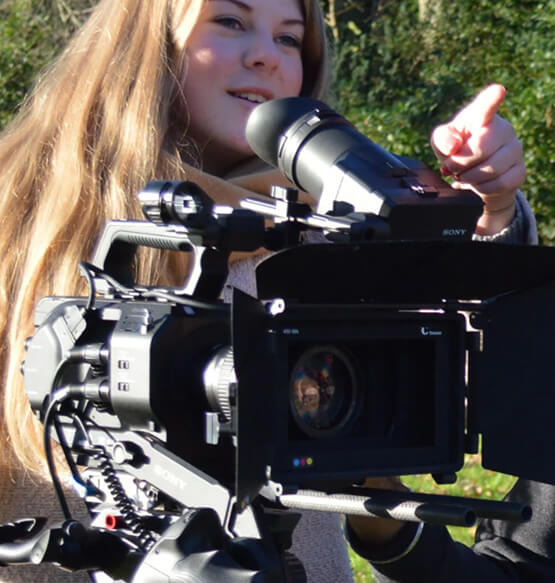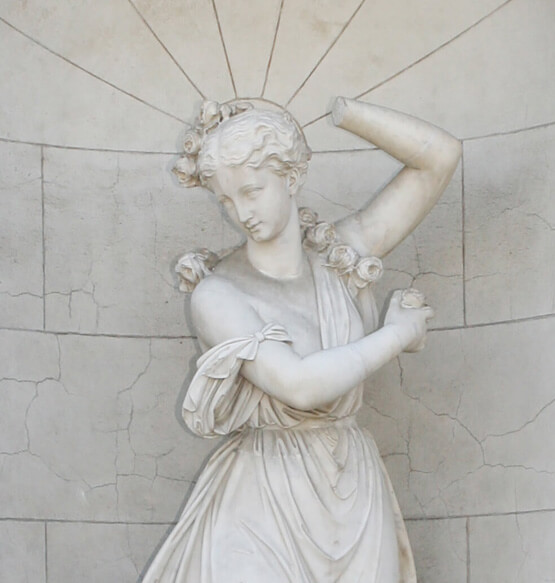Entry tariff:
112–128 UCAS points (or equivalent)
UCAS Code:
W500
Start date(s):
September 2026
Study Dance at Roehampton, a world-renowned programme with a practical focus. Learn from industry leaders as you dance, choreograph, and explore ideas to prepare for an exciting career in the ever-changing dance world.
Our innovative curriculum equips you with the expertise needed to thrive in the arts.
You’ll develop skills in:
- Advanced dance techniques
- Choreographic strategies
- Critical thinking
- Public presentations
- Scholarly discussions
- Technical production
Did you know?
We are ranked number one in the UK for the impact of our research in dance (Research Excellence Framework 2021).

Alongside these, you’ll master transferable skills essential for any career, including:
- Collaboration
- Project management
- Interdisciplinary approaches
- Self-motivation
- Networking
You’ll explore dance’s role and potential impact in multicultural and global contexts, encouraging imaginative and forward-thinking perspectives.
You'll learn from passionate lecturers who are not only advocates for dance but also mentors committed to honing your critical and professional skills. Through hands-on learning - dancing, creating, debating, and reflecting - you’ll build expertise in-depth. Collaborative projects will prepare you to excel in team settings, a key aspect of any profession.
Modules
Module overview:
This module contextualises and extends the idea of dance professionalisation through embodied exploration of international popular cultures in dance and contemporary theatre practices studied across our undergraduate Dance provision, including Techniques and Improvisation. From musical theatre to digital dance/dance on screen, this module also teaches you to approach your professional journey through a sustainable, inclusive, and ethical manner (including teaching students about anti-racism, anti-transphobia and other forms of social inclusion and restorative justice). Understanding other dancers and cultures and sub-cultures begins with each dancer’s understanding and healthy approach to their own body, which then can be ready for equitable collaboration and empathetic, and truly inclusive interaction with new cultures. In contextual seminars this module broadens the understanding of dance participants and maker with their potentially different audiences. In studio classes you will extend your contemporary and commercial dance techniques (for instance, Jazz, K-Pop, Afro-Caribbean and African dance styles etc.), as well as practice safe in dance/healthy dance somatic approaches and foundations of wellbeing through dance science.
How you'll learn:
You'll learn through weekly lectures and seminars, plus one commercial dance workshop. There will be an additional 30 minutes of asynchronous digital support per week, comprising online viewings, tutorials, and/or guided tasks on module themes.
Module overview:
This practice module introduces a foundation study of dance techniques and movement improvisation, using a range of studio classes and individual workshop tasks. You are encouraged to draw connections between codified dance techniques, somatic practices, and other contemporary and commercial dance styles and genres which reflect recent developments in dance practice. The improvisation strand develops understanding of movement initiation and development, the use of imagery, sensation and the key foundations of body-form, dynamics, space and time as well as making compositional decisions in real-time
The module guides you to explore and challenge your own movement tendencies and your assumptions about dance technique and improvisation, in order to find more efficiency, functionality and expressivity in your dancing, and to begin developing a broader dance vocabulary through your practice. Drawing on knowledge about the human body from Contemporary and Commercial Dance you will support this.
How you'll learn:
You'll learn through practical classes, workshops, laboratory sessions, peer review and tutorials.
Module overview:
This vibrant module establishes a foundation of choreographic skills that will evolve and flourish throughout this degree. You will learn to craft movement with intention. The compositional skills developed in this module offer frameworks for presenting and encountering the rich movement qualities that will be developed in the complementary Autumn module, Techniques and Improvisation. You will acquire practical skills in the studio in tandem with contextual discussion and study of related artistic practices. For example, you will learn how to perceive, occupy and shape space in choreography, alongside contextual discussions about how space is something we experience socially, politically and artistically. Choreographic skills are developed through short weekly tasks that build towards a final project. Opportunities for reflecting on practical compositions and contextual discussions are offered through simple writing tasks across a range of styles, from social media posts to reflective writing, that are designed to support each student’s voice to prosper: knowing how to talk about your choreography and movement practice will be essential to your future career. This is an exciting module that will stretch your practice and understanding of choreography and its place in the world.
How you'll learn:
You'll learn through a weekly practical session and seminar. Practical workshops will cover the compositional and choreographic practice, while seminars will consist of hybrid exploration of the contextual understanding of choreography more broadly.
There will be an additional 30 minutes of asynchronous digital support per week. This will consists of videos of choreographic work and digital sources for enrichment of the study.
Module overview:
This practice-based module continues to work with the skills and techniques that begun in the Autumn term with Techniques and Improvisation and begins to explore testing these for performance settings focusing on functioning well and finding the expressive body.
You will have the opportunity to interrogate your technical knowledge of dancing and deepen your awareness of communicating movement. Focus will be on performative qualities alongside essential technical practice. Rehearsal and presentation of a tutor-led final performance will offer an introduction to professional theatre practices, such as studio rehearsals, technical and dress rehearsals, and performance to a live audience. Here you can demonstrate the performative skills acquired in your first year in a final performance.
How you'll learn:
You'll learn through four sessions per week, split between regular technique training and rehearsing a dance piece with your tutor.
These are the current planned modules on this course and may be subject to change.
Module overview:
This module offers intermediate training and allows you to advance your practical dance skills in the context of dance art seen and performed in 21st-century Britain, within broad multicultural, global and artistic contexts. You will advance your practical dance and improvisation skills developed in Year 1. Approaches will be drawn from a variety of dance styles and movement practices and may include codified dance techniques (such as ballet and contemporary techniques), improvisation, somatic movement practice, and other popular and commercial styles appropriate to recent developments in the sector, preparing you to become a versatile practitioner.
Emphasis will be on the development of movement skills, energy use, strength and control, while expanding interpretative skills and performance quality.
Understanding embodied knowledge and the principles of movement, and how to work with others through sharing embodied understandings, development of the soft skills that dance is known for and are transferable to other contexts, is at the core of this practice module.
There is a focus on the acquisition of self-reflective and problem-solving skills equipping you with focus, concentration and resilience to be able to expand your physical and mental potential and to develop your communicative skills individually and in groups. You will be expected to become self-reliant practitioners and to develop your personal professional practice including class preparation, methods of injury prevention, awareness of well-being and the ability to collaborate and contribute to a community of practice.
How you’ll learn:
You’ll learn through practical studio sessions, supported by 30 minutes of weekly asynchronous content with audio-visual resources to reinforce your practice.
Module overview:
This module introduces you to the diverse career paths open to dance professionals, and to skills and responsibilities in research, funding, collaborative work and promotional activities. It prepares you for successful careers in the dance or creative arts professions through exposure to practical examples, drawing on real industry experiences. The module also considers the social context in which professionals create, curate and respond to work, addressing for instance political parameters such as arts policy and politics and the relationship between art and society. It fosters your growth mindset and motivation to become an engaged professional who is aware of your position in the community and the functions of dance within political and social frameworks.
How you’ll learn:
You’ll learn through weekly seminars and experiential learning, plus 30 minutes of asynchronous support with audio-visual and written materials. You’ll take part in tutor-led sessions to explore dance professions and their contexts, and you'll be encouraged to actively engage through discussions and practical tasks.
Module overview:
This module follows on from Techniques and Embodied Principles in order that you can continue to extend your practical dance skills into performance. Approaches will be drawn from various cultural backgrounds, including codified dance techniques, improvisation and other contemporary and commercial dance styles appropriate to recent developments in choreographic practice. The emphasis of the module is on the development of performance skills and the problems and possibilities of ‘being seen’ (Deborah Hay) considering the performer-audience relationship in a range of potential performance spaces, such as the theatre, sites-specific, digital and commercial contexts. There is a focus on professional practice including the preparation of material, rehearsal skills and daily practice to support the final project of the module. The value of concentration and resilience will be revealed as ongoing tools of practice, so that you can develop the confidence to perform and to communicate in a group. Students will form groups to work on publicity material to promote their performance, such as posters, programmes and social media platforms as well as tools for reflection and documentation.
Classes will be accompanied by music, acknowledging dance and its potential within an interdisciplinary context. Dancers will gain a developed understanding and confidence of working with music.
How you’ll learn:
You’ll learn through weekly practical classes and workshops. The practical classes will cover two dance styles, while the workshops will focus on developing a performance. You’ll also get 30 minutes of weekly asynchronous support with audio-visual materials to reinforce both practical and performance work.
Module overview:
In this module you further develop your choreographic practice alongside related skills in production and lighting for dance. It builds on foundations laid in the first year to advance techniques in movement composition, structuring choreography and conceiving coherent aesthetic projects. The safe use of theatres and their technical equipment, as well as foundations for lighting design, are introduced throughout the module as instrumental to developing choreographic craft. Choreographic and lighting design skills are explored as transferrable across sites of screen, stage or public place. You are supported to develop their unique artistic voice in this module. You will refine your choreographic ideas through a series of compositional studies and draft lighting design that lead to a final choreographic project.
How you’ll learn:
You will learn through a mix of weekly practical choreography sessions and practical production workshops. There will be an additional 30 minutes of asynchronous digital support per week. This will consists of videos of cheogaphic work and lighting design examples to study
Module overview:
This module provides an opportunity for an optional work placement year between the second and third year of the degree.
This module is available as an option to all students studying on the listed programmes. This one-year (sandwich year) module is additional to the 360 credits of a 3-year degree programme.
Participating in a work placement year will enable you to develop employability skills across a longer period. It thus complements and builds on the employability skills developed through the curriculum throughout the first two years of the degree programme.
These are the current planned modules on this course and may be subject to change.
This course offers all students the option of a one-year paid work placement, to boost your employability even further. If you choose this route, you will take the placement following year two of your course, and then return to complete your degree.
Why take a placement?
A placement year is the perfect opportunity to gain valuable work experience, to build on the career skills we will teach you on this degree. The connections you make on the placement will improve your career prospects further, and equip you with the skills you need to secure graduate-level employment.
How we support you
The University's Placement and Work Experience Team are experts at helping you to secure a placement. They will work closely with you from the start, helping you research potential employers, discover placement opportunities, create and pitch your CV, and will coach you to perform well in interviews. We aren't able to guarantee a placement, but our sector-leading advisors will give you the best possible chance of securing one.
Find out more about how we'll support you
We understand that your plans might change once you start your programme. If you decide not to do a placement, you will have the option of completing the three year version of your programme.
Whatever your choice, you will have access to many opportunities for work experience through our Placement and Work Experience Team, and access to face-to-face and 24/7 online careers support.
Module overview:
This module provides a framework for you to explore your advanced movement potential using a variety of approaches drawn from a range of dance contemporary, commercial and somatic practices with consideration to global perspectives. The technical, performative, improvisational and interpretative challenges of dancing are scrutinised and the interplay between physical, imaginative, observation and analytical skills is interrogated and developed. The module articulates questions about how dancers experience movement quality in relation to space and time and how detailed embodiment of movement arises through testing (trial and error) and safe and effective practice. Alongside a personal practice, the module will propel you to advance your skills and engage with expressive and interpretative group tasks in relationship to music, sound accompaniment, or text and to find methods of working with awareness and sensitivity in relationships with other dancers. Acknowledging dance’s potential within an interdisciplinary, professional and commercial context, dancers will gain advanced confidence in working with music and understand principles of collaboration in art making.
The continuity of ‘training’ through regular classes prepares you for the physical and mental demands of the various roles within the profession, such as navigating a portfolio career, as a dance artist such as performer, choreographer, teacher or community artist, as well as in related professional areas, in health, education, fitness, well-being sectors, or in related roles in the creative industries, including fashion, social media, design, commercials and video games.
It also asks transferrable soft skills such as resilience, critical self-reflection, adaptability and flexibility as well as an awareness for selfcare and safeguarding a healthy practice.
How you’ll learn:
You’ll learn through weekly practical classes.
Module overview:
This module supports your individual artistic voices to flourish as you build on compositional abilities developed throughout the programme. You will further advance their skills in choreography, technical production and applied lighting, as well as in Screendance, to explore and realise their full artistic vision. You are supported to refine your own choreographic style through studies that ask in what ways movement quality, dramaturgical structure, scenographic design and expression can interact. Staging is explored as the choices that can be made about how an audience encounters choreography, whether on screen, stage, gallery, or public site. Opportunities for collaboration run throughout the module as students support each other to realise creative and production elements of their projects. The module features extensive peer appraisal, drawing on different models to evaluate work and to receive feedback, including articulating one’s own choreographic intention in formats that replicate industry practices. The skills in technical production acquired in this module, and in the 2nd year module Choreography and Production, means you graduate ready to enter any dance production situation with the vocabulary and practical knowledge to engage professionally. You will create their strongest choreographic works and be ready to introduce them to the professional world.
How you’ll learn:
You’ll learn through a mix of practical choreography class and practical production and lighting classes weekly. There will be an additional 30 minutes of asynchronous digital support per week. This will consists of video examples of exemplary work for both choreography and lighting design.
Module overview:
In this module you will work on a live brief of a tutor-led choreography commission to develop a dance performance project. Cross-pollinating the practical and contextual skills and knowledge acquired from previous modules The Dance Profession in Social Contexts, Choreography, Production and Aesthetics, and Advanced Dance Practices, you will envisage, organize and develop a performance with all its accompanying aspects from digital and/or live, site-specific content creation, rehearsal and production. Working in groups, you will apply methods of devising and collaboration, exploring strategies of shared authorship and co-creation. Performance is approached in relation to trends and industry practices and can be realized either as a live event in a traditional theatre setting or an installation or a site-specific performance, or a digital event with outcomes of mediated choreography, on screen and on other digital platforms. Attention will be given to aspects of access and inclusivity, considering diverse audiences and media.
Professional practice and performance will be reinforced through technique classes, increasingly establishing an independent working attitude enabling the transition into the field after graduation. You will identify roles, and plan, curate and organize all relevant activities, such as rehearsal schedules, curation of the sharing event, promotion and documentation including programme notes, curator statements, social media content production and publicity, digital images, video content and post-performance reflections. The module offers an opportunity to gather material to develop a personal performance portfolio including a showreel, visual identity design (web presentation), and other related material.
How you’ll learn:
You’ll learn through practical dance classes and hybrid classes each week in the Spring term. The practical sessions will build your dance skills, while the hybrid sessions will focus on creating a performance event based on a tutor-led brief. You’ll also get 30 minutes of weekly asynchronous support with audio-visual resources to help develop your digital portfolio.
Module overview:
The Dance Industry exposes you to the key aspects of the dance industry and its infrastructure – teaching, community dance, festivals, dance organisations, the freelance dance artist, researching. It will offer you a rounded picture of these aspects through giving an overview of the research on the topics and analysis of the real-life contexts and issues that currently challenge the dance and arts sectors. The module will propose several case studies from the dance industry for you to engage with through research, problem solving or creative imagining. The module is designed to provide tools to think widely and deeply about professional scenarios and to learn more about the dance infrastructure in the UK and internationally. The module content draws on first year module Contemporary and Commercial Dance and second year module Dance Professions in Social Contexts, and these modules should be seen as contributing to your understanding and knowledge in The Dance Industry.
You will be taught through tutor-led seminars and workshops to enable you to gain a critical understanding and deeper knowledge of the dance industry. You will be encouraged to take a pro-active engagement in sessions, contributing to discussion and practical tasks.
How you’ll learn:
You’ll learn through a mix of seminars and experiential learning. There will be an additional 30 minutes of asynchronous digital support per week. This will consists of audio-visual and written material.
These are the current planned modules on this course and may be subject to change.
Careers
The arts are evolving, and this course will support you to be a resilient, responsive and energetic contributor to a range of fields.
You will graduate ready to create, identify and respond to opportunities in the future of Dance and related industries.
Your future role could be:
- Choreographer
- Dancer
- Movement director
- Community artist
- Arts company director
- Arts programmer
- Project manager
- Teacher/ Academic
- Cultural policy advisor
Whether you want to be front and centre stage, behind the lights, moulding the next generation of talent or working in policy and advocacy, this degree will equip you with the tools you need to succeed. It also opens an array of opportunities in other fields by developing key transferable skills throughout your three years at Roehampton.

Our dance alumni
Our successful dance alumni include:
- Holly Blakey, award-winning choreographer for music videos, catwalks and stage (Harry Styles, Rosalia, Dior, Gucci)
- NewKyd (Titilayo Adebayo), international performer including with Trajal Harrell company
- Robyn Cabaret, producer with Jersey Arts and former Senior Producer at Sadler's Wells
- Tom Bowes, Lecturer at Northern Contemporary Dance School
- Maya Pindar, learning & participation coordinator for Frantic Assembly.
Learning and Assessment
How you'll learn
In state-of-the-art studios and an inspiring community of staff and students, you’ll uncover your unique place in the evolving world of dance.
Guided by renowned staff, guest artists, producers, teachers, and organisers, you’ll engage with the latest practices and contribute to vibrant discussions about dance today. Through:
- Practical classes
- Workshops
- Laboratories
- Lectures
- Seminars
- Digital skills sessions
Learning Tailored to You
Your classes will use diverse formats to help you build both breadth and depth of knowledge. Led by highly qualified lecturers, you’ll explore and express ideas through practical tasks such as creating visual portfolios, using social media, choreographing in the studio, and developing skills for discussing and writing about dance. These varied approaches will enhance your academic performance and refine your ability to articulate ideas with confidence and excellence.
Find out more about our dance spaces and studios

How you'll be assessed
Your assessments reflect the real-world of dance, preparing you for your future.
You will be assessed through authentic formats that reflect a range of entry points to the professional world. These include:
- Audition formats
- Performing live
- Project proposals
- Presentation of reflective ideas – live, digital and written
- Participation and collaboration
- Presenting choreography and production skills
How We Support You
Assessment formats are carefully designed to help you deliver your best work while equipping you with career-ready skills. Whether preparing for a mock audition or crafting a project proposal, you’ll receive clear guidance from lecturers on what each assessment is meant to develop and evaluate.
You’ll also learn how these assessment formats connect to various roles within the dance and arts industries, giving you the confidence and context to apply these skills after graduation.
Course staff
You will be taught by artists and researchers who are leading specialists in their fields and provide an excellent springboard for you to thrive in your career in dance and the arts.
Open days
Get a real taste of our campus, community and what it’s like to study at Roehampton
Applying
Full-time UK undergraduate students apply through UCAS.
Entry tariff
112–128 UCAS points (or equivalent)
Looking to work out your UCAS points or find out about our entry requirements? Find out more.
When we consider applications to study with us, we form a complete view of your achievements to date, and future potential, and can offer flexibility in entry requirements. Find out more about our Contextual Offer scheme.
We welcome applicants with a wide range of qualifications, including BTECs, A-levels and T Levels.
Specific entry requirements
Applicants who are not currently taking/do not hold a qualification in dance will be asked to submit performance footage. For further information please email admissions@roehampton.ac.uk.
General entry requirements
International undergraduate students apply through our direct application system.
Entry tariff
112–128 UCAS points (or equivalent)
Looking to work out your UCAS points or find out about our entry requirements? Find out more.
When we consider applications to study with us, we form a complete view of your achievements to date, and future potential, and can offer flexibility in entry requirements. Find out more about our Contextual Offer scheme.
Specific entry requirements
Applicants who are not currently taking/do not hold a qualification in dance will be asked to submit performance footage. For further information please email admissions@roehampton.ac.uk.
General entry requirements
Fees and funding
UK students
Tuition fees
| Entry date | Undergraduate Year 1 |
|---|---|
| September 2026 | £9,790 |
Prices shown are for the first year of your degree.
Funding your studies
We also provide other ways to support the cost of living, including on-campus car parking, hardship support and some of the most affordable student accommodation and catering in London.
International students
Tuition fees
| Entry date | Undergraduate Year 1 |
|---|---|
| September 2026 | £17,628 |
Prices shown are for the first year of your degree.
Funding your studies
We also provide other ways to support the cost of living, including on-campus car parking, hardship support and some of the most affordable student accommodation and catering in London.


